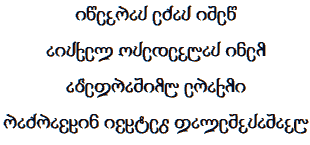Georgian love poem
სარკე
შენი სახე სარკეში
ჩემი საუკეთესო ლექსია
იჩქარე უჩინარდება
უკანასკნელად გეტყვი მიყვარხარ

A transliteration of my poem
Sark’e
Sheni sakhe sark'eshi
Chemi sauk'eteso leksia
Ichkare uchinardeba
Uk'anask'nelad get'q'vi miq'varkhar

→ French poem ←
Georgian woman & language
The "I love you" of this Georgian love poem (სიყვარული პოემა) is said: მიყვარხარ (mikyvarxar). Your reflection is the most beautiful Georgian (Common Kartvelian, Gruzinski, Kartuli) quatrain that i know. It has the blondness of your hair, and the blue of your eyes. My Georgian lady, I often imagined you without finding you. You! will you find me? I believe that yes, one day, a fine day of full sun, in your room flooded with light, you will read my little poem.
The ancient kingdom of Colchis (which is actually Georgia), in the 10th century, is the country where Homer has Jason landing in search of the golden fleece. Maybe you come down from the Argonauts.
Georgian (Kartvelian, Gruzinski, Kartuli) is the official language of Georgia, a country in the center of the Caucasus. It is also spoken in Zakatala, a district of Azerbaijan. This language belongs to the family of Caucasian languages, which are not all genetically related to each other. It is the most spoken language of this group, and the only one with an ancient literary tradition. One will write the language, to facilitate the propagation of Christianity, adopted as official religion by King Mirian of Kartli (330).
There are several dialects, and it is one of the rare languages of this region to have its own alphabet "mxedruli". Tradition brings back its invention, in the 3rd century under the impetus of King Pharnavaz. The first Georgian alphabet is known as Khutsuri. The current script is thus called mxedruli (Mkhedruli), and the language is written from left to right without upper or lower case.
Modern Georgian is based on the Eastern dialect (kartlian). It was codified in the middle of the 11th century. This Kartlevian language is spoken by 5 million speakers.
We divide the language into three old Georgian period (5th-11th centuries)! Medieval (12th-18th centuries)! Modern (after 1800). The language will be influenced by Persian, Russian, English, Greek, Armenian, Arabic and Turkish.
Georgian literature
The oldest inscription dates back to +430. The "Shushanik Martyr" by Iak'ob Tsurt'aveli (476-483), is the first work in this language. The oldest manuscript (the Sinai Polycephalon) dates from 864.
Heir of a long oral tradition, the litterature is initially clerical. In the 12th, we must note the book "Glory and eloge of the Georgian language" by Zocime, a book because of borrows is a testimony of dead languages. In the 12th century a profane literature developed, a golden age followed by a chaos from which emerged the poetry of the kings of Kakheti, Teimouraz and Artchil.
It's under Thamar queen, that Chota Roustaveli write the great monument of the Georgian literature: "The knight with tiger skin", which is one of the masterpiece of the mondial literature.
Durant les siècles qui suivirent, la langue géorgienne, sous les pressions de puissants ennemis Perse et Ottoman, devient un des pilier de la lutte nationale. It is in Moscow that the Georgian poets Orbeliani, Gouramishvili and Gabashvili prepare the Georgian awakening.
The union of Russia stimulates romanticism. Ilia Tchavtchavadze, poet and essayist founds the "Pirveli Dasi", the "Meore Dasi" is created by the poets Tseretheli and Niko Nikoladze.
In the 20th century, Georgian poets use symbolism: Tabidze and Abacheli.
Laz poem